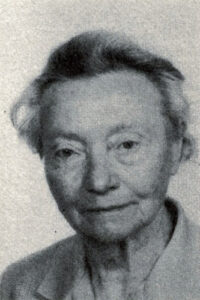Humanity in War: Charlotte Gaede and the care for sick foreign forced laborers after the end of the Second World War (Published on 12/07/2025, latest update on 31/08/2025)
Charlotte Gaede, born in 1914, reports on her experiences in the fall of 1945 while caring for sick young foreigners in a barrack camp in Western Pomerania (source: Dollinger, “Kain, wo ist Dein Bruder? Was der Mensch im Zweiten Weltkrieg erleiden musste – dokumentiert in Tagebüchern und Briefen“ [“Cain, where is your brother? What people had to endure during the Second World War – documented in diaries and letters”] (1983), S. 388 ff.; translation from German language):
“It was shortly after the end of the Second World War. After a long illness, I was recovering in my home town in Western Pomerania. One day I was given the task of caring for the sick in the barracks camp. These were young foreigners who had been brought to Germany ‘voluntarily’ by the German authorities to provide auxiliary services. Their healthier comrades had returned to their home countries shortly before the collapse. These sick people had not been able to do so…
I opened the door – and recoiled in horror. Disgust gripped me like never before in my life. No, not another step! What I saw was indescribable and the foul smell of decay almost took my breath away. I saw a table with spoiled, dirty food, swarming with flies and maggots, wooden beds piled on top of each other with soaked straw sacks and filthy blankets, in between overflowing buckets with the excrement of the sick. Big, wide-open eyes stared out at me from the waxy, parched faces of the beds. And it was these eyes that ultimately prevented me from running away from this horror. They burned me to the bottom of my soul. Fear, mistrust, indifference, even hatred, all together, spoke from those eyes. And behind them, the knowledge of imminent death, a lonely, bitter death far from all love and kindness…
I approach one of these wretched figures, tormented by a terrible cough. I look into a pair of big blue eyes full of horror. The lips twitch, trying to form words, but they only become a moan. I wipe the sweat and tears from the twitching face. Then a cold, damp hand grabs my arm, clutching it tightly as if it were a lifeline. And then it rises up inside me, all I can see is the agony of these people. I take my heart in both hands, I gain the strength to overcome my disgust every day. I look after the sick, make sure they are clean, that they eat regularly and that their pain is alleviated. A doctor visits from time to time, but help is no longer possible in most cases of advanced tuberculosis…
After a while, it was as if they sensed my desire to help. There was something like gratitude in their eyes when I approached their beds in the morning. They didn’t understand my language and I understood very few of theirs. But I can see them all clearly before me, the pale, sorrowful and yet still so young faces: Robert, Pierre and Romain from France; the lovely Germaine, who was like mother and sister to them at the same time and gave them little handouts. They revered her almost like a saint. For all their poverty and hardship, they were still rich because they could talk to each other. The others from the various eastern countries were much more miserable because they could not communicate. Germaine was the only one to see her homeland again. When she was gone, they withered away like plants without light…
The loneliest and most shocking figure was Peter, a very young Ukrainian, barely out of boyhood. His passport photo showed him as a burly lad in a white Russian shirt with embroidery, looking cockily out into the world. I could imagine him once trotting across the fields of his homeland on a horse. And now: haggard features, two deep wrinkles from his nose to the corners of his mouth, his lips pressed together into a thin line. In his eyes unfathomable sadness, bitterness and contempt for humanity… One morning I found Peter with flushed cheeks and panting breath, covered in cold sweat. His pulse was fluttering, his eyes shining supernaturally. I knew the end was near. Peter would barely survive the day. His eyes looked at me with a masterful expression and seemed to be demanding something. His hand pointed at the sun’s rays flickering in through the open door. Suddenly I understood. He wanted to go out into the sun again. I shuddered, this could be his death.
I asked myself whether he wouldn’t have to die otherwise, sooner or later? Then I shook my head. What sadness in his eyes! But then he slowly got up, his strength all gathered, his will tense. I helped him and dragged him to the door. He stands in the sun, smiles blissfully and drinks in the sun. I feel a great tenderness for him. Tears well up in my eyes. I hold the skinny, swaying body tightly and lead him back. Exhausted, gasping for breath, he lets himself fall and closes his eyes. His face relaxes. He is asleep. I stroke his hair. The next morning, Peter is dead. He is still smiling in death, he has taken his sunbeams into the great silence…”
(Head picture: Barbed wire embedded in spider webs
on a pasture near Duisburg, July 2012)
If you wish to support my work, you can do so here. Many thanks!


